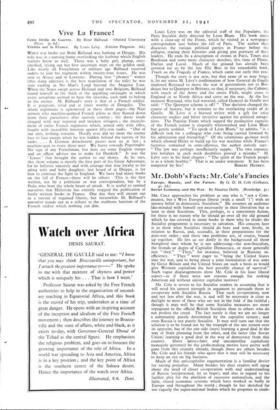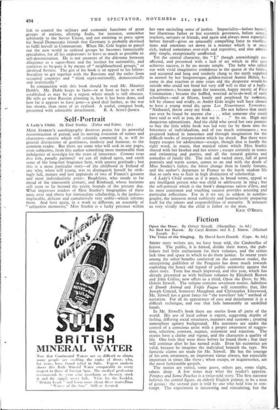Mr. Dobb's Facts : Mr. Cole's Fancies
Soviet Economy and the War. By Maurice Dobb. (Routledge. 3s.)
MR COLE approaches his problem as one who is " not a Com- munist, but a West European liberal (with a small '1') with an intense belief in democratic Socialism." He assumes an audience like-minded with himself not necessarily in their liberalism but at least in their Socialism. This, perhaps, is a convenient fiction, for there is no reason why he sluiuld go over all the old ground which he has covered in many books to show why he thinks the Socialist programme is necessary to salvation. His concern here is to show what Socialists should do here and now, firstly, in relation to Russia, and, secondly, in their preparations for the post-war order • and these two problems are, of course, bound up together. He lets us see dimly in the background all those benighted ones whom he is not addressing—the non-Socialists, the friends or dupes of Capitalist Democracy, or more generally just " they." " They," for instance, believed in Russian in- efficiency. " They " were eager to " bring the United States into the war, and to bring about a joint formulation of war aims by Great Britain and the United States on such a basis as would give Western capitalism the best possible chance of survival." Such vague disparagements show Mr. Cole in his least liberal aspect—as if there were not reasons enough for seeking American aid without sinister capitalist motives!
Mr. Cole is severe to his Socialist readers in assuming that it will need his utmost strength in argument to persuade them to co-operate with Socialist Russia. That such co-operation, now and not less after the war, is and will be necessary is clear as daylight to most of those Who are not in the fold if the faithful ; though it may well be that some Socialist measures are more repugnant to the official British Socialists than to others who do not profess the creed. The fact surely is that we are no longer a community purely determined by the capitalist system ; and even Russia is not purely Socialist. It may well turn out that the solution is to be found not by the triumph of the one system over its opposite, but of the one side (ours) learning a good deal in-the way of State planning from the other, and the latter (the Soviet Union) learning a good deal in the way of democracy from this country. Sheer laissez-faire and uncontrolled capitalistic monopoly governed by the profit-making motive have pretty well gone from this country already, though there are others besides Mr. Cole and his friends who agree that it may still be necessary to keep an eye on big business.
Much of this anti-capitalist argumentation is a familiar device for raising prejudice. Many besides his elect readers will agreg about the need of closer co-operation with and understanding of Russia (reciprocated, let us hope); and also in regard to his further plea for the abolition of excessive nationalism, and the little, closed economic systems which have worked so badly in Europe and throughout the world ; though he has sketched far too vaguely the supra-national bodies which he proposes to estab- lish to control the military and economic functions of great groups of nations, allotting India, for instance, somewhat arbitrarily to the Soviet Union, and not omitting to press upon his Social Democratic friends that Germany is probably destined to fulfil herself in Communism. When Mr. Cole begins to parcel out the new world in ordered groups he becomes fantastically speculative, for all his endeavours to leave as much as possible to self-determination. He is not unaware of the dilemma between allegiance to a super-State and the instinct for nationality, and contrives to by-pass it by means of " neighbourhood groups," or idealised Soviets. The gist of his book is an appeal to his fellow- Socialists to get together with the Russians and the exiles from occupied countries and " think supra-nationally, democratically and realistically." In conjunction with this book should be read Mr. Maurice Dobb's. Mr. Dobb keeps to facts—or at least to facts as well established as may be in a region where much is still obscure. He tells us what Russian planning is, how it has been done, and how far it appears to have gone—a good deal farther, as the war has shown, than most of us realised. A useful, compact book, presented with admirable detachment. R. A. Scorr-JAMEs.



























 Previous page
Previous page